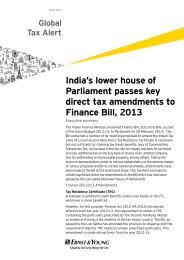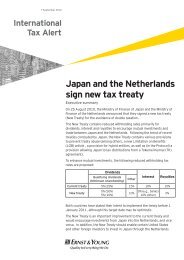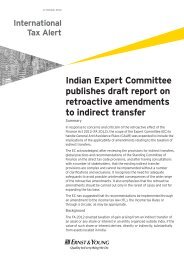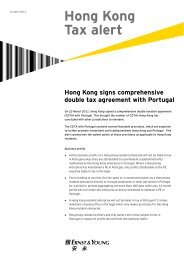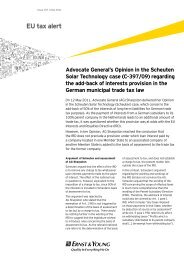Download - Ernst & Young T Magazine
Download - Ernst & Young T Magazine
Download - Ernst & Young T Magazine
Create successful ePaper yourself
Turn your PDF publications into a flip-book with our unique Google optimized e-Paper software.
Credit: Muir Vidler Expatriate postings Management<br />
Making relocation<br />
a success<br />
Despite their obvious benefits for any executive pursuing a global career,<br />
expatriate postings all too often end in failure. So what can be done<br />
to help ensure a successful assignment?<br />
• By David Balchover<br />
Anecdotal evidence strongly suggests that<br />
a significant proportion of expatriate<br />
placements end in failure, with workers<br />
returning earlier than planned to their home<br />
country, thus giving their company an<br />
organizational headache and creating further<br />
costs. So what causes these placements to end in<br />
disappointment for both worker and employer?<br />
And, more practically, what can be done to help<br />
expatriates overcome these difficulties and<br />
thrive in their new role in a distant land?<br />
Many expatriate postings might actually be<br />
doomed to failure before they have even begun,<br />
To avoid potential conflict or<br />
failure, companies need to test for<br />
cultural sensitivity<br />
simply because the particular employee is poorly<br />
suited to living and working abroad. Nearly<br />
three-quarters (73%) of respondents (all of them<br />
current or recent expatriates, or those who had<br />
overall responsibility for assignments) to a 2010<br />
Economist Intelligence Unit survey cited “cultural<br />
sensitivity” as the most important attribute in a<br />
Summary<br />
Despite the obvious<br />
benefits to both<br />
employees and the<br />
firms they work for, a<br />
significant proportion<br />
of foreign placements<br />
end in failure. But<br />
various measures can<br />
help ensure a greater<br />
likelihood of success,<br />
from better initial<br />
planning through to<br />
better support for the<br />
expatriate’s family.<br />
successful expatriate. If you<br />
don’t have the ability to<br />
perceive cultural differences,<br />
you are destined to struggle in<br />
both the workplace and your<br />
wider social life in a foreign<br />
environment.<br />
“Managers who struggle are<br />
the ones who aren’t sufficiently<br />
flexible to adjust their<br />
management style; what has<br />
been successful in their home<br />
country for years suddenly<br />
doesn't work any more, and they find it difficult<br />
to adapt to the new situation,” says Thomas<br />
Efkemann, an Executive Director for Assignment<br />
Services at <strong>Ernst</strong> & <strong>Young</strong>. “You need to have<br />
different managerial approaches available, and<br />
then you select the best one according to the<br />
circumstances.”<br />
Several management thinkers, most notably<br />
Geert Hofstede and Fons Trompenaars, have<br />
sought to measure cultural differences in the<br />
workplace, comparing attitudes across the world<br />
to various concepts such as teamwork, hierarchy<br />
and risk. Any expatriate who ignores the intricate<br />
subtleties of national culture will soon pay the<br />
penalty.<br />
35%<br />
The proportion of spouses<br />
working during an assignment,<br />
down from 89% that were<br />
working prior to the placement,<br />
according to the Permits<br />
Foundation.<br />
<strong>Ernst</strong> & <strong>Young</strong> Issue 07 T <strong>Magazine</strong> 31









